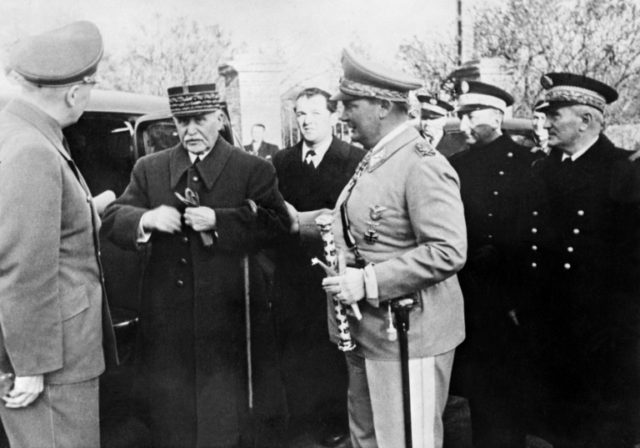Paris (AFP) – France’s collaborationist wartime leader Marshal Philippe Petain — who history has condemned for betraying his country to the Nazis — may have had Alzheimer’s disease, a new study has shown.
Professor Jean-Marie Serot, a French geriatric specialist, believes the general, a World War I hero hailed as the “Lion of Verdun”, was already suffering from the condition when France fell to the Germans in June 1940.
Petain was 84 when he became head of the Vichy regime, which passed similar anti-Semitic laws to those in Germany and actively hunted down Jews.
More than 72,500 rounded up in France perished in the death camps.
As the all-powerful head of the puppet state, the general also pushed through a far-right programme of “national renewal”, replacing the republican motto of “Liberty, Equality and Fraternity” with “Work, Family, Nation”.
But Professor Serot told AFP that Petain was very likely suffering from Alzheimer’s when he came to power in “1940 and was at the major neurocognitive disorder stage from 1942”.
By the time of his death in an island prison off France’s west coast in 1951, he showed all the typical signs of Alzheimer’s, the retired specialist argued in a paper published in a respected French medical review.
“We know that the disease sets in and develops over many years,” he added.
– He would ‘sign anything’ –
Petain was condemned to death in 1945 but because of his age the sentence was commuted.
Serot said he was “pretty sure” of his diagnosis from reading accounts of the general and watching archive footage, even though it was impossible to be sure without a specific medical examination or a post-mortem.
Stories have circulated for years about the general’s attention span, apathy and memory problems which the doctor believed worsened as the war went on.
Albert Chichery, France’s agriculture minister in July 1940, wrote that “the Marshal is good for three or four hours a day… but when he is tired, especially in the evening, you can get him to sign what you want without him realising”.
French historian Laurent Joly, whose latest book, “The State Against the Jews: Vichy, the Nazis and anti-Semitic persecution”, was widely acclaimed, told AFP that he found the theory plausible.
“It is rather in line with the portrait I drew of the old general in my book,” he added.
“For me it was (Petain’s prime minister) Admiral Francois Darlan (assassinated in Algiers in 1942), his successor Pierre Laval and the police chief Rene Bousquet who really ran things. Petain condoned the worst (things they did) without really imagining the consequences,” said the historian.
– Petain ‘was sick’ –
Bousquet, a lifelong friend of the later French president Francois Mitterrand, was himself murdered in 1993 just before he was to be tried for deporting Jewish children to the death camps.
However, US historian Robert Paxton, who is credited with exposing the eagerness and extent of regime’s collaboration with the Nazis in his definitive book “Vichy France: Old Guard and New Order”, has his doubts about the extent of Petain’s infirmity.
“Almost all the testimony (the study relies on) are from memoirs written after the events, almost always after the war,” he told AFP.
“An informed historian prefers contemporaneous accounts unaltered by later events.
Going through the American archives from 1941 to 1942, and the German ones from the following year, “it is clear that Petain was an old man slowing down, but he wasn’t really senile,” Paxton insisted.
By 1947, however, he clearly was, he admitted.
Serot said that as a doctor it was not his job to judge if Petain was responsible for his actions.
“I simply say that he was sick.”
If the Alzheimer’s could be proved it would clearly alter how historians judge the general, Joly said.
“But without absolute proof, it does not fundamentally change what specialists of the period have long suspected, that the general had a form of senility.”

COMMENTS
Please let us know if you're having issues with commenting.